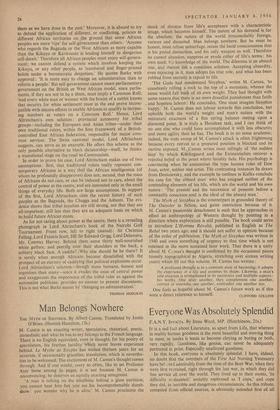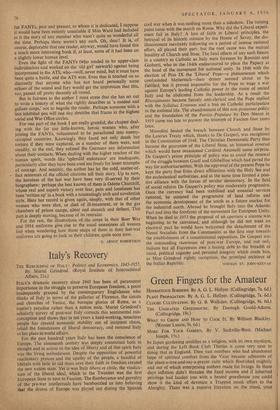Everyone Was Absolutely Splendid
F.A.N.Y. INVICTA. By Irene Ward, MP. (Hutchinson, 21s.)
IT is a sad fact about Literature, as apart from Life, that whereas in reality human goodness is the most beautiful and moving thing to meet, in books it tends to become cloying or boring or both, very rapidly. Goodness, like genius, can never be adequately portrayed in print. Especially unalloyed goodness.
In this book, everyone is absolutely splendid. I have, indeed, no doubt that the members of the First Aid Nursing Yeomanry have bet ived admirably from the time of the Boer War, when they were first recruited, right through the last war, in which they did fine service all over the world. They lived up to their motto, 'In difficulty undaunted,' amiably rephrased as 'I cope,' and cope they did, in horrible and dangerous circumstances. As this tribute, compiled from official sources, is obviously intended first of all
for FANYs, past and present, to whom it is dedicated, I suppose it would have been entirely unsuitable if Miss Ward had included in it the story of any member who wasn't quite so wonderful all the time. Perhaps there weren't any such. Oh, dear! It is, of course, deplorable that one reader, anyway, would have found this a much more interesting book if, at least, some of it had been on a slightly lower human level. Even the fight of the FANYs (who tended to be upper-class individualists and worked on the 'old girl' network) against being incorporated in the ATS, who—well, never mind, but it must have been quite a battle, and the ATS won. Even that is touched on so discreetly that anyone who has not heard personally some echoes of the sound and fury would get the impression that this, too, passed off pretty decently all round.
But in fairness to the author I must stress that she has set out to write a history of what she rightly describes as 'a modest and gallant corps,' not to beguile the reader. Perhaps someone with a less inhibited pen will one day describe that fracas in the highest social and War Office circles.
For one part of the book I am really grateful, the chapter deal- ing with the far too little-known, heroic women who, after joining the FANYs, volunteered to be parachuted into enemy- occupied countries. Knowingly they faced not only death but torture if they were captured, as a number of them were, and steadily, to the end, they refused the Germans any information about their contacts. When dealing with the higher reaches of the human spirit, words like 'splendid endurance' are inadequate, particularly after they have been used too freely for lesser triumphs of courage. And sensibly, the author has let the cold, matter-of- fact sentences of the official citations tell their story. Up to now, the heroines of the last war have been very ill-served by their biographers: perhaps the best known of them is Odette Churchill, whose real and superb victory over fear, pain and loneliness has been 'written up' in a book with a nauseatingly arch and novelettish style. Here her record is given again, simply, with that of other women who were shot, or died of ill-treatment, or in the gas chambers of prison camps, silent and staunch and defiant. This part is deeply moving, because of its restraint.
For the rest, the illustrations a the corps in their Boer War and 1914 uniforms give rise to the usual uneasiness all women feel when wondering how those snaps of them in their last-war uniforms are going to look to their children, quite soon now.
E. ARNOT ROBERTSON



































 Previous page
Previous page